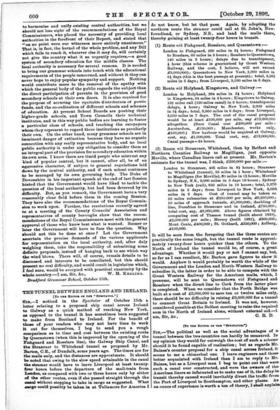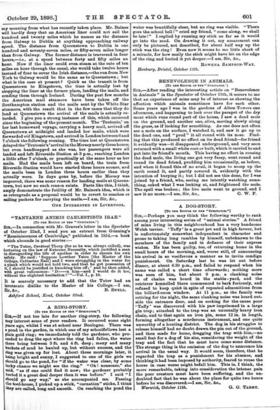[TO THE EDITOR OP THAI " srzaTiroH.'•] SIR,—The political as
well as the social advantages of a, tunnel between the two countries can hardly be measured. In my opinion they would far outweigh the cost of such a scheme should it be found capable of realisation ; but as regards Mr. Baines's counter proposal for a ship canal across Ireland, it seems to me a chimerical one. I leave engineers and those better acquainted with Ireland than I am to reply to Mr. Baines, but as a Liverpool man I beg to point out that were such a canal ever constructed, and were the owners of the Amerioan liners so infatuated as to make use of it, the delay in transit thereby caused would inevitably divert the traffic from. the Port of Liverpool to Southampton, and other places. As an ounce of experience is worth a ton of theory, I shall explain my meaning from what has recently taken place. Mr. Baines will hardly deny that an American liner could not sail the hundred and twenty miles which he names as the distance from Galway to Dublin at anything approaching railway speed. The distance from Queenstown to Dublin is one hundred and seventy-seven miles, or fifty-seven miles longer than from Galway. The former distance is traversed in four hours,—i.e., at a speed between forty and fifty miles an hour. Now if the liner could even steam at the rate of ten miles an hour through the canal, she would take twelve hours instead of four to cover the Irish distance,—the ran from New York to Galway would be the same as to Queenstown ; but what is the case at present ? Quick as the transit is from Queenstown to Kingstown, the time is actually lost by stopping the liner at the former place, landing the mails, and sending them through Ireland. During the past few months the American mail steamers have been taken off the Southampton station and the mails sent by the White Star steamers, with the result that in the few cases that they do land at Queenstown the arrival of the mails is actually re- tarded. I give you a strong instance of this, which occurred since the beginning of the present month. The 'Teutonic,' on her last homeward voyage, carrying a heavy mail, arrived off Queenstown at midnight and landed her mails, which were forwarded rid Kingstown, and arrived in London between 6 and 7 o'clock the following evening. The time lost at Queenstown delayed the' Teutonic's ' arrival in the Mersey nearly three hours; but even handicapped as she was, her passengers were all landed and left Riverside Station at 3 p.m., reaching London a little after 7 o'clock, or practically at the same hour as her mails. Had the mails been left on board, the train from Riverside Station would have started three hours sooner, and the mails been in London three hours earlier than they actually were. In days gone by, before the Mersey was improved, there was some reason for landing mails at Queens- town, but now no such reason exists. Facts like this, I think, amply demonstrate the futility of Mr. Baines's idea, which is as retrograde as a proposal would be to revert to coaches or sailing packets for carrying the mails.—I am, Sir, &c.,
ONE INTERESTED IN LIVERPOOL.







































 Previous page
Previous page